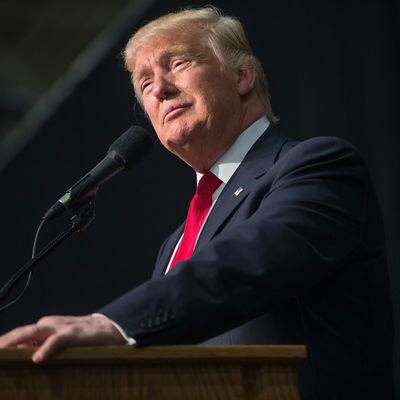
Incredibly, there are still some people who don’t believe Donald Trump will make America great again, so the president-elect has been searching for some immediate, tangible proof that he’s turning things around for American workers. Keeping a Lincoln plant open in Kentucky would have served this purpose nicely, but the story was marred by the revelation that Trump took credit for working with Ford to save American jobs, though its plant was never moving to Mexico.
Now Trump has a better example of how his deal-making skills are saving the country, even before his inauguration. Trump and Carrier, which makes heating and air-conditioning equipment, said on Tuesday that they have reached a deal to keep nearly 1,000 jobs in Indiana, rather than shifting them to Mexico.
Trump and Vice-President-elect Mike Pence, Indiana’s governor, are set to appear at Carrier’s Indianapolis plant to reveal the details on Thursday.
The company, which is owned by United Technologies, announced in February that it would close two Indiana Carrier plants, one in Indianapolis and another in Huntington, cutting 2,100 manufacturing jobs across the state over the next few years. Video of the announcement went viral, and Carrier’s move was criticized by several presidential candidates, including Ted Cruz, Hillary Clinton, and Bernie Sanders. The company said the decision was financial; the Indianapolis Star reported that while most Carrier workers in Indiana were making $26 an hour plus overtime, their Mexican replacements would earn a base wage of $3 an hour.
Trump frequently called out Carrier on the campaign trail, threatening to “tax the hell” out of any goods they imported from Mexico. “You’re going to bring it across the border, and we’re going to charge you a 35 percent tax,” he said, explaining Carrier executives would quickly change their tune. “Now within 24 hours they’re going to call back. ‘Mr. President, we’ve decided to stay. We’re coming back to Indianapolis.’” (At one point Trump owned stock in United Technologies, but he did not mention that at rallies.)
Trump’s appeal to white workers in the Rust Belt was key to his win, and in interviews with the New York Times, Trump voters in Indianapolis made it clear that they will turn on him if he doesn’t follow through on his promise to keep the Carrier plant open. “Trump made Carrier the poster child and said he would hold Carrier accountable. Well, we’re going to hold him to it,” said Chuck Jones, president of the Local 1999 of the United Steelworkers union.
On Thanksgiving, Trump tweeted that he was “working hard” to get Carrier to remain in the U.S., even on the holiday, and said they were “making progress.” So far the terms of the deal — and Trump’s involvement — remain unclear. CNBC reported that the agreement was negotiated by Pence and United Technologies CEO Greg Hayes, and that Carrier was offered new incentives from the state of Indiana. The New York Times reported that Trump and Pence are expected to reiterate their pledge to lower corporate taxes and ease regulations, while toning down the threats on tariffs.
Also unclear: exactly how many Carrier jobs will remain in the United States. Carrier said it would keep “close to 1,000” jobs in Indianapolis, but the plant there has about 1,400 employees. There was also no mention of the Huntington, Indiana, plant, which employs 700 people, or the 400 research and development jobs the company previously promised to keep in the state.
Jones, the United Steelworkers 1999 president, told the Washington Post that the union was not involved in the negotiations. “We’re trying to figure out what the hell is going on,” he said.
Clearly, it’s fantastic news that at least some Carrier workers in Indiana will keep their jobs. “I’m ready for him to come,” Robin Maynard, who’s worked at the company for 24 years, said of Trump’s Thursday visit. “Now I can put my daughter through college without having to look for another job.”
It’s also a big PR win for Trump, though it says little about his ability to solve the larger issues driving U.S. jobs overseas — and it may actually set a bad precedent for other companies. University of Michigan economist Justin Wolfers tweeted:
Vox’s Matt Yglesias quipped:
And in his statement on the deal, Senator Joe Donnelly of Indiana highlighted another problem:
While this is good news, in Indiana alone, there are at least two other companies currently planning to move Hoosier jobs out of the country. We need to change our laws to encourage companies to grow here at home.
Though we can’t assess the deal until we know the details, it does seem encouraging that the president-elect is following through on his promise to advocate for the working class. But even if Trump’s negotiating skills are as brilliant as he claims, having the president work out deals with individual companies is not the blueprint for a functional economy.






























